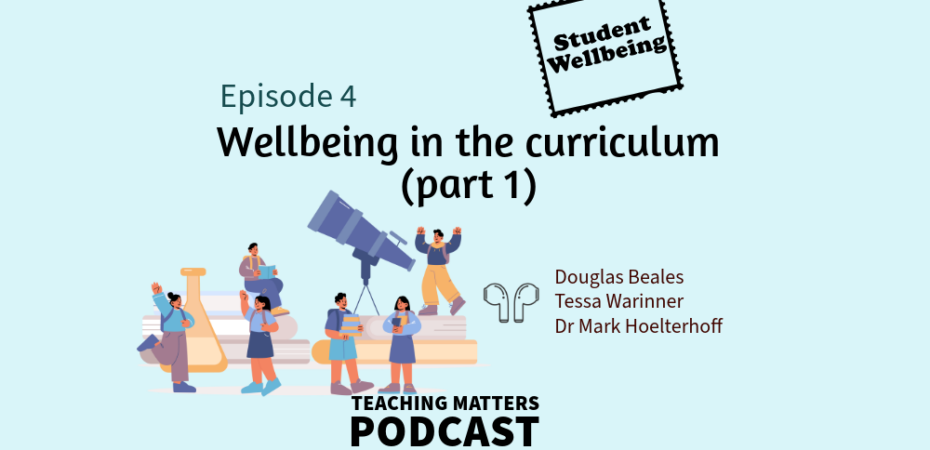
In the first part of this three-part podcast, Wellbeing Advisers Douglas and Tessa discuss with Dr Mark Hoelterhoff the definition of wellbeing and touch upon the origins of a group project that Mark was a part of called ‘Wellbeing in the Curriculum’. They cover themes of different perspectives around wellbeing, positive psychology and the importance of wellbeing throughout the university experience. This episode belongs to Podcast series: Student Wellbeing↗️
After initial introductions Douglas poses the question of what we mean by wellbeing in reference to an extract from the WHO definition:
“Well-being is a positive state experienced by individuals and societies. Similar to health, it is a resource for daily life and is determined by social, economic and environmental conditions. Well-being encompasses quality of life and the ability of people and societies to contribute to the world with a sense of meaning and purpose.” (Health Promotion Glossary of Terms 2021, World Health Organisation, pg. 10, 9789240038349-eng.pdf (who.int))
Mark suggests wellbeing can mean many things.
“…it’s a great question because we use the term wellbeing I think in modern society in many different ways. And I think the even the definition of the World Health Organization reflects quite an adaptive and cultural and developmental perspective of how we see wellbeing”
We reflected on the importance of seeing wellbeing as more than just a lack of negative symptoms. This is in opposition to the often-held perception of wellbeing within the illness model.
“…even if we colour code the language and are conscious of how we communicate, if we’re honest, our focus is still on the struggles and the suffering. And there’s nothing wrong with being focused on struggling and suffering, especially when we’re serving a vulnerable population like students. Of course, we should be aware of that. But the absence of disease, the absence of symptoms, is not wellbeing“
Mark discusses the influence of Martin Seligman’s work on his way of thinking about wellbeing, in particular his ideas on flourishing versus languishing and the PERMA model (Seligman, M. (2011). Flourish. New York, NY: Free Press)↗️.
“I also like the model flourishing versus languishing, that we’re not actually talking necessarily about the presence of mental illness or the coping of mental illness. But we’re talking, are we growing? Do we feel like we’re going somewhere?”
Douglas then asks Mark about the origins of the group project he was a part of called “Wellbeing in the Curriculum”. Mark describes the aims of the project:
“It’s like, let’s kind of come together as a university and say, well, what do we mean by trying to implement wellbeing specifically in the curriculum? So that paper that you’re referencing again was a group project among people who are academics, people who were in student services and professional services and so on, even the chaplaincy, about how do we want to explore and understand wellbeing in general?”
Tessa remarks on her own positive experiences of wellbeing informing university approaches during her time studying in America. She says,
“But I can understand that here in Edinburgh, which is a huge school with these huge, huge bureaucracies and processes specifically around exams and final assessments, and how teaching is supposed to be conducted, I can see that from a tiny little women’s College of 4000 students to a massive institution like us that can have a problem with scaling up”
The episode concludes with Mark briefly touching upon some of the challenges with implementing wellbeing into the university:
“I think it’s not only scaling up to the largeness of University of Edinburgh, it’s also understanding the culture in which this university sits. Both the academic culture but also the larger culture and the international students that we have and we have quite an interesting mix of people here and so is it transferable? “
Timestamps:
(00:43): Introductions
(02:52): What do we mean by wellbeing?
(10:57): What were the origins of the project entitled Wellbeing in the Curriculum?
(15:46): Tessa talks about her experiences at university,
(17:46): Mark discusses some of the challenges around implementing wellbeing into a large institution such as Edinburgh University.
Douglas Beales and Tessa Warinner are Student Wellbeing Advisers at the Student Wellbeing service, The University of Edinburgh. Dr Mark Hoelterhoff is a lecturer in clinical psychology at The University of Edinburgh and recently has been working on the idea of well-being in the curriculum.
Episode produced and edited by:
 Sylvia Joshua Western
Sylvia Joshua Western
Sylvia is currently doing her PhD in Clinical Education at The University of Edinburgh and has a Master’s degree in Clinical Education. Her PhD research explores test-wise behaviours in Objective Structured Clinical Examination (OSCE) context. Coming from a dental background, she enjoys learning about and researching clinical assessments. She works part-time as a PhD intern at Teaching Matters, the University’s largest blog and podcast platform through Employ.ed scheme at the Institute of Academic Development.
Twitter/X: @sylviawestern↗️


